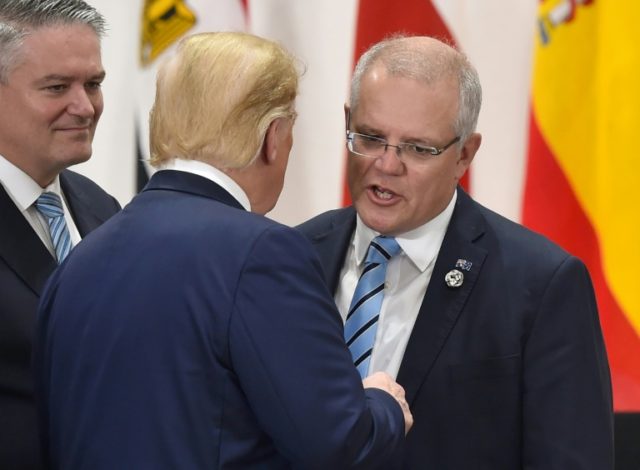Washington (AFP) – Don’t expect any awkward silences when President Donald Trump and Australian Prime Minister Scott Morrison sit down to a rare state dinner at the White House on Friday.
They already agree on curbing asylum seekers, playing down climate change fears, pushing back against Iran, and excluding China’s Huawei from their 5G phone markets.
This is “one of our strongest and most enduring relationships anywhere in the world,” a senior Trump administration official said Thursday, asking not to be identified.
Australian flags are fluttering alongside the Stars and Stripes at the White House, where Morrison will get a red carpet, honor guard, joint press conference and then dinner in the beautiful Rose Garden.
Morrison may air Australia’s nervousness about Trump’s trade war with China. In June, he warned of smaller economies suffering collateral damage and of the global system coming “under real pressure.”
But this is likely to be a relaxed meeting between political friends, albeit with a lot of pomp and ceremony.
Although the head of state in Australia is Britain’s Queen Elizabeth II, not Morrison, the White House is giving this the most prestigious category of state dinner.
It’s only the second time that has been granted in the Trump presidency and the first for an Australian premier here since John Howard in 2006.
On Sunday, Morrison and Trump will reunite for a visit at a new Australian-owned factory in Wapakoneta, Ohio, that the White House says will “demonstrate the strong trade and investment relationship.”
– Growing China challenge –
Trump’s relations with the previous Australian premier, Malcolm Turnbull, got off to a bad start.
But even though it’s end of summer in Washington, there’ll be plenty of diplomatic warmth on Friday.
Morrison will cement his place in a growing conservative club — also including the likes of Brazilian President Jair Bolsonaro and British Prime Minister Boris Johnson — drawn into Trump’s orbit.
Trump has defied controversy over his push to prevent illegal immigrants and asylum seekers from crossing the Mexican border. Similarly, Morrison, a former immigration minister, has worked to make Australia less attractive to would-be asylum seekers.
His Liberal-National coalition also has much in common with Trump’s climate change skepticism, rejecting overwhelming scientific warnings to encourage lucrative fossil fuel industries. Australia is the world’s largest coal exporter.
Australia has joined Trump’s coalition to patrol the Strait of Hormuz, where Iranian forces threaten to interfere with the massive international flow of oil exports.
One area that Trump especially appreciates is trade where the United States enjoys a surplus. The trade conflicts proliferating under Trump have bypassed Australia.
The administration official said that cooperation between Australia’s space agency and NASA on a return to the Moon and joint efforts to ensure “stable and secure” access to rare earth metals will be on the agenda.
But the relationship gets more complicated over how to deal with China.
Under Trump, the United States has embarked on what some are comparing to a new Cold War with its rival economic superpower. Huge trade tariffs and growing competition in the military-strategic sphere are sending ripples through the entire Pacific region.
As China rises, there are even worries in some quarters that Australia may not always be able to rely on its US security umbrella.
A hard-hitting report from the United States Studies Centre at the University of Sydney in August said the US military is an “atrophying force” that is “dangerously overstretched” and “ill-prepared” for a confrontation with China.

COMMENTS
Please let us know if you're having issues with commenting.